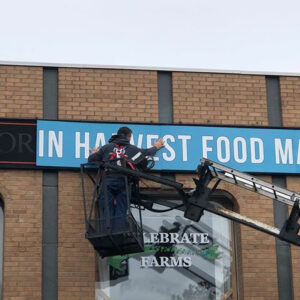
I’m super excited that my book about what I’ve learned at the food co-op is going to be published by the University of Massachusetts Press. It should be out in 2024, if all goes well.
The title was originally going to be An Anthropologist in the Grocery Store, which seemed to capture the main narrative trajectory (this anthropologist walks into a grocery store) and some of the counter-intuitive pairing of the scholarly and avocational sides of my life these past few years.
But once the peer and editorial reviews were in, there were reservations about the title. Some people worried it made the whole book sound more academic than it is, some that it was misleading (I wasn’t doing anthropological research in the grocery store, after all), others that it was too vague and should suggest more about what I actually learned as an accidental grocer.
“Accidental grocer” was a great potential substitute, but it turns out it’s already been used. So we went round and round on other possibilities and fell straight down the sink-hole that is food language – or rather, the way that the scale and expectations of the modern industrial food system have weirdly shaped and hollowed out the very words that are available to us for talking about food.
Take “food system.” I thought maybe the title could incorporate that, since it’s a very commonly-used term among people who are working on food and farming issues.
But it isn’t self-evident to everyone, as I discover every year when I use it in a lecture and someone pipes up to ask, “What is the food system, anyway?” It’s a good question, and of course all systems are constructions that we make for ourselves to create a sense of order. So “the food system” is an idea or a model as much as a reality, and it doesn’t necessarily get us where we need to go in understanding what’s going on with food. It’s also a wonky term, potentially alienating to those not in the know (as my students continually remind me).
I also thought we could work “industrial” or “industrialized” (or maybe even “deindustrialize”) into the title or subtitle, since what I’m really talking about in the book is the challenge of going up against – and undoing – the entrenched economic and emotional and infrastructural affordances of our all-but-fully-industrialized mainstream ways of making and getting food.
But not everybody grasped that intuitively. When I polled my friend group about this, some people weren’t sure what “industrial food” even was, which shows how completely mainstream those industrial supply chains are at this point. Industrial food is just, well, food.
And deindustrialization, while it’s something I’m always interested in, was a non-starter. Too academic, too specialized, too many syllables, too everything.
A smart colleague who had read the whole manuscript finally pointed us in a direction that has worked, keying off the idea of “margins.” It’s a central concept in the book, in the sense of exploring both the little-known (by the general public) economic guts of the modern food business and the relationship of that mainstream juggernaut to the people and places that exist around the margins, depleted and exploited and sidelined in countless ways over the four-plus centuries that the juggernaut has been taking shape.
So here’s what we ended up with: Food Margins: Lessons from an Unlikely Grocer. It feels like a good place to have landed.
And now that it’s settled, I’m struck by how very similar this felt to the seemingly endless debates at the co-op itself about what we should put on the big sign on the front of the building, which I wrote about in my previous post. This discussion hit so many of the same points: should it be “grocery store” or “co-op” or “market” or what? do we have to have “food” in there? how can we make this shorter, catchier, clearer? are there any terms that everyone will understand in the same way? (spoiler alert: no)
As with food itself, we’re working within language that has been profoundly shaped by the very things we’re trying to change. So we struggle and argue and try to get as close to clarity as we can. And then we get back to business, because there’s a lot of work to be done. I’m hoping this book can prompt a few more people to get further into doing more of it, while searching for good ways to tell other people what they’re learning.
Super. Fits. I like it. Congratulations.
Thanks, Sue!
An interesting read about your pathway to finding the right title. I really like what you’ve chosen and look forward to reading it. As I continue my journey to strive for a healthy relationship with food, understanding the industrial/capitalism impacts and the chemical manipulation to make things cheap and hyper-palatable has been eye-opening. And helpful. I think folks in the “sugar-free world” are going to be interested in your book.
Yes, I’m hoping this will resonate with people rethinking things from a bunch of different angles. Thanks for these thoughts!
Can’t wait to pick up my copy!